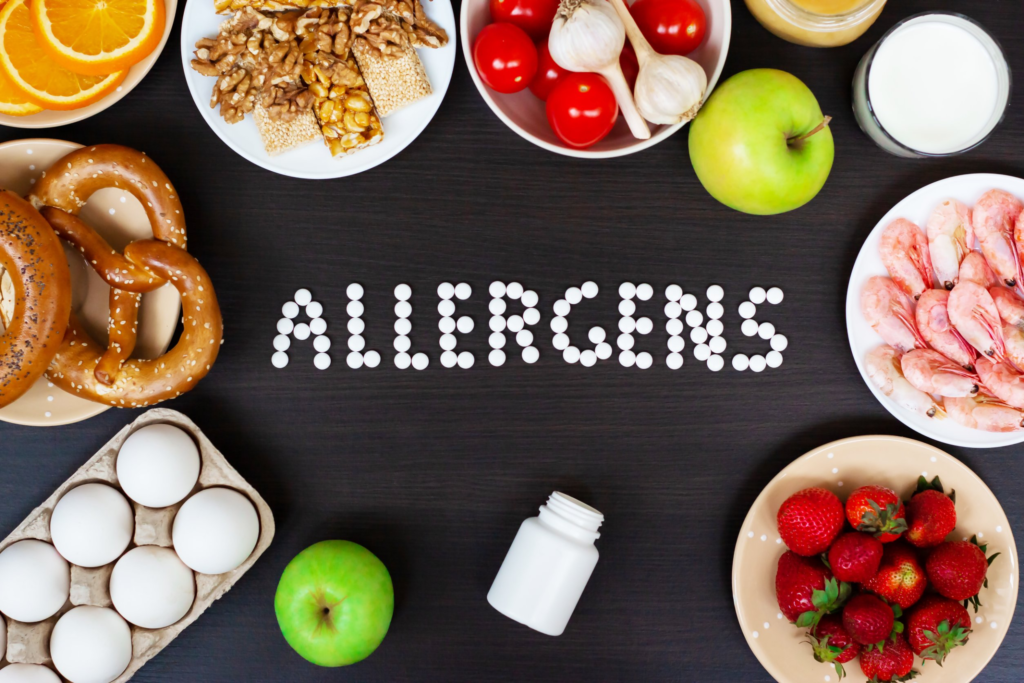A 2024 report has revealed a troubling truth Hidden Food Allergens in Gulf Products are present in 22% of packaged food items, putting millions of consumers at risk, especially those with severe food allergies. The study, conducted across major supermarkets and food production units in the Gulf Cooperation Council (GCC) countries, has exposed a concerning lack of allergen transparency and food safety standards.
This report raises urgent health and regulatory questions, as allergic reactions from undeclared allergens can range from mild to life-threatening.
What the 2024 Report Reveals

The comprehensive analysis focused on over 1,500 packaged food products available in the Gulf region. Food safety inspectors and researchers from independent food labs found that 22% of these items contained one or more hidden food allergens, including:
- Gluten
- Soy
- Milk proteins (casein and whey)
- Tree nuts
- Eggs
- Shellfish
- Sesame
These allergens were not clearly labeled or were completely missing from the ingredient list. This is a violation of international food labeling guidelines and GCC regional food safety laws, especially in the United Arab Emirates, Saudi Arabia, and Qatar.
Why This Is a Serious Health Concern
Hidden Food Allergens in Gulf Products are not just a labeling issue they are a serious health threat. For people with food allergies, even small traces of allergens can trigger reactions such as rashes, stomach pain, vomiting, breathing difficulty, and in extreme cases, anaphylaxis.
A recent case in Kuwait involved a 10-year-old boy who suffered a severe allergic reaction after consuming a chocolate snack that contained undeclared nuts. Incidents like these are increasing, pointing to the lack of enforcement in allergen labeling in Gulf countries.
Countries With the Highest Risk Levels
Among the GCC countries studied, the highest rates of undeclared allergens were found in:
- Saudi Arabia – 26% of sampled products had hidden allergens
- United Arab Emirates – 21%
- Kuwait – 19%
- Qatar – 17%
- Oman – 14%
- Bahrain – 13%
Local products, as well as imported goods from Asia and Europe, were found to be equally affected. Researchers note that smaller manufacturers and imported budget brands were more likely to skip proper allergen labeling.
Types of Products Most Affected
The 2024 report found Hidden Food Allergens in Gulf Products across a wide variety of categories. The most affected product types included:
- Baked goods (breads, cakes, and cookies) – 31% had hidden allergens
- Ready-to-eat meals – 26%
- Snacks and confectionery – 24%
- Sauces and condiments – 19%
- Dairy alternatives – 18%
- Protein bars and supplements – 17%
Some of these products even carried misleading labels such as “dairy-free” or “gluten-free,” while still testing positive for milk proteins or gluten traces.
Consumer Rights and Industry Responsibility
Gulf consumers are becoming increasingly health-conscious and expect food manufacturers to be transparent. Under GCC food regulation policies, it is mandatory for all packaged food items to disclose the presence of major allergens.
But the 2024 findings show that many companies are not following this rule. Consumer protection agencies in the region are now pushing for stricter penalties, product recalls, and random inspections to eliminate undeclared allergens in the market.
Dr. Amina Khaled, a public health expert based in Dubai, said:
“The lack of allergen transparency can no longer be tolerated. It’s time to hold food manufacturers accountable before more lives are put at risk.”
How to Protect Yourself
If you or your family members have food allergies, here are some precautions to follow:
- Always read food labels carefully look for allergens even in small print
- Avoid products without allergen declarations
- Choose brands with third-party certifications (like ISO or HACCP)
- Call the manufacturer directly if unsure about an ingredient
- Report any reactions to health authorities to help with future recalls
The awareness of Hidden Food Allergens in Gulf Products is growing, but consumers still need to be proactive when it comes to their health and safety.
What Gulf Authorities Are Doing

In response to the 2024 report, food safety regulators across the Gulf region have begun launching new initiatives:
- Random testing of packaged food products
- Public databases of allergen-safe and unsafe food brands
- Updated labeling standards, requiring clearer allergen symbols
- Training programs for local manufacturers on allergen control
Bahrain and the UAE have also announced stricter penalties for companies that fail to declare allergens on labels. Violations can now lead to product bans, factory shutdowns, and heavy fines.
Conclusion
The rising issue of Hidden Food Allergens in Gulf Products is a public health crisis waiting to explode. With 22% of packaged foods in the region found to contain undeclared allergens, urgent action is required from both industry leaders and regulatory bodies.
Consumers, too, must stay informed and vigilant. Only with combined efforts can the Gulf region ensure food safety for its allergic population and prevent unnecessary health risks in the future.
Also Read – Gulf Food Innovation Labs Launch 10 New Plant-Based Products in 2025



